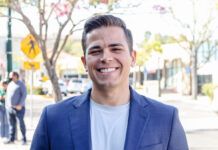An Occupy movement that began on the East Coast in September has made its way to Southwestern College in Chula Vista.
At an event on the campus’ free speech patio, three college professors focused on motivating students ages 18 to 24 to get involved in political change.
During the forum last Thursday, professors presented information on Occupy movements around the nation, where approximately 200 students attended.
Professors Phil Saenz, Alejandro Orozco and Victor Chavez addressed economic disparity, corporate greed, the rising cost of tuition and voter registration.
Saenz, who teaches political science, said his goal is to encourage students to vote so their voices are heard.
“The Occupy movement is significant because it represents the power of the people to bring about change,” Saenz said. “Less than half of 18- to 24-year-olds voted in the last election.”
Orozco, who teaches philosophy in the college’s language and literature department, said that current conditions around the nation are making the U.S. a corporatocracy.
In other words, he said, democracy is designated by the top 1 percent.
“The world has witnessed the power of the people in northern Africa, the Middle East and Europe… People in America also want change and are finally awakening from their political comas,” Saenz said.
Orozco said that part of philosophy is political science, which studies creating the greatest good for the greatest number (of people).
“What we have are policies being enacted for the fewest,” he said. “We’re looking at a political structure that basically creates legislative loopholes that benefit the top 1 percent of income earners in the country.”
At the forum, students supported a list of demands as a contract between them and candidates including a freeze on tuition, language that forces state legislatures to be the final say on increasing tuition rather than political appointees, a two-thirds vote in both houses before any increase is approved, eliminating taxes on textbooks and required educational materials or reducing the taxes and requiring publishers of school textbooks to continue books unless there are significant changes in the materials.
Orozco said that political activism is incredibly effective and powerful.
“In 1960 when black people began occupying lunch counters in the deep South, no one could have predicted that four years later there would be a significant Civil Rights Act,” he said. “Just like no one could have predicted that the U.S. would end their involvement in Vietnam.”
Saenz agreed.
“People’s movements have toppled dictatorships,” he said. “I believe we could impact elections and the economy by showing a united voice that is committed and not backing down…”
Saenz is organizing a voter registration drive at various locations on campus, as well as on-line through the college’s home page, web advisor and blackboard.
He said the contract may take on different forms including petitions through social media such as Facebook or physical petitions presented to candidates at meetings or through e-mail.
Saenz said the upcoming elections are critical in a democracy.
“Electing public servants who represent the views of the people will go a long way to bringing about change,” he said.
Saenz plans to hold political forums for candidates representing the college including the 51st and 53rd congressional district as well as the 77th, 78th and 79th Assembly districts to ask for their support.
Saenz also asked students to support not buying gas on Mondays as a statement that Americans and consumers don’t appreciate unwarranted gas hikes.
At California colleges, tuition continues to rise. While the current enrollment fee for resident students at Southwestern College is $36 per unit, it will likely increase to $46 by next spring.
“The policies happening in the country are affecting those seeking higher education,” Orozco said. “We have fewer tax dollars to fund education.”
In addition, Orozco said that when banking institutions created a surplus number of unqualified buyers it created a housing bubble.
“Banks have paid hundreds of millions to settle fraudulent charges and are guilty of not paying taxes,” he said. “The bottom line is the housing bubble created by them (banks) led to this huge debacle and middle America bailed them out.
“The financial situation we’re in is not a mistake… This was something that was created.”
Orozco said he believes the protests will go on for a while.
“It will continue like the Vietnam protests did,” he said. “There’s a perfect storm of unemployment, political disenchantment and corruption.”











